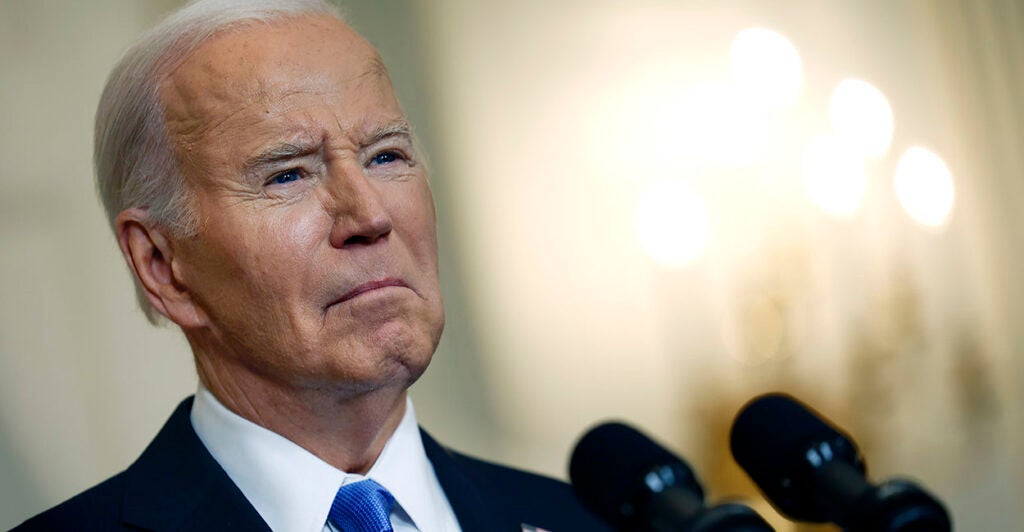Juan Gonzalez, who led the Biden administration’s curious policy of embracing anti-U.S. Marxist leaders in Latin America while making enemies of their pro-Western counterparts, has resigned his post as the National Security Council’s top hemispheric adviser.
Gonzalez (no relation) will depart President Joe Biden’s National Security Council in March to spend more time with his children, an anonymous official told Bloomberg on Tuesday.
The resignation came a day after Argentina’s new president, Javier Milei, sent to the U.S. a seized Venezuelan cargo plane that has ties to Iran. The action underscored the folly of stiff-arming genuinely pro-American leaders while supporting those who may be leftist ideological allies of this White House but are archenemies of America’s national interests.
As the National Security Council’s senior director for the Western Hemisphere, Gonzalez personified that approach.
“Gonzalez is the architect of the administration’s failed Venezuela policy as well as most of the politicized aspects of our current regional engagement,” Andres Martinez-Fernandez, The Heritage Foundation’s top Latin American expert, emailed me Tuesday night. “Friends of the U.S. in the region will be glad to see him go.” [The Daily Signal is Heritage’s news outlet.]
Gonzalez has wooed Venezuela’s Marxist strongman, Nicolas Maduro; Colombian President Gustavo Petro, a former member of the M19 armed terrorist-guerrilla movement; and Brazilian President Luiz Inacio Lula da Silva, another Marxist leader with an anti-American animus.
On a trip just this month to South America, Gonzalez again tried to sell the baffling idea that Colombia’s Petro would not only be the ideal intermediary between Maduro and the opposition he regularly crushes but also between Maduro and Washington.
“Colombia can serve as an important bridge, not just at building dialogue between the opposition and Chavismo, but also frankly between us and Venezuela,” Gonzalez was quoted by Bloomberg as saying Feb. 5 from Bogota.
The idea isn’t just baffling but dangerous. Petro would not be a good-faith arbitrator, given that he is much closer ideologically to Maduro, a fellow Marxist. That would put Venezuela’s vulnerable opposition in an even more hazardous position than Gonzalez had already put them in.
It was Gonzalez, after all, who led the disastrous policy of ending the Trump administration’s sanctions on Maduro in exchange for empty promises by the Venezuelan dictator of “free and fair elections” this year.
Sen. Chuck Grassley, R-Iowa, excoriated Gonzalez in a Nov. 3 letter for easing the sanctions on Venezuela. Grassley noted what happened a mere week after the Biden administration lifted the sanctions: “Venezuela’s high court suspended the opposition’s entire primary elections process, ratified Maduro’s ban on three candidates running for office, and ordered the organizers to turn over documents identifying registered voters. Now, Nicolas Maduro—a man known for arbitrarily detaining and torturing his dissenters—has a list identifying his opponents by name.”
Gonzalez also worked on the U.S. release of Alex Saab, an emissary between Iran and Venezuela who was behind bars in Miami for two years but now lives free in Caracas.
On the other hand, the White House allowed associates of Gonzalez to work to prevent the election of Argentina’s Milei, a Trumpy libertarian who took office in December. Milei stands for conservative principles that the people around Biden despise. (He’s speaking at CPAC next weekend, for example.)
Milei sent the Venezuelan-Iranian cargo plane to the U.S. after a two-year stay in Argentina. The aircraft had been sold to Venezuela’s state airline Emtrasur by Iran’s Mahan Air, which the U.S. Justice Department calls a sanctioned “Iranian airline affiliated with the Islamic Revolutionary Guard Corp-Quds Force (IRGC-QF), a designated Foreign Terrorist Organization (FTO).”
“The United States’ forfeiture of the Boeing 747 cargo plane culminates over 18 months of planning, coordination, and execution by the United States government and our Argentine counterparts,” the Justice Department’s written statement quotes Assistant Secretary of Export Enforcement Matthew Axelrod as saying.
Milei solved this problem because, as he has stated from the start, he wants an “international geopolitical agenda aligned with the West and [its] defense of the values of freedom.” That is why Iran, China, and Russia opposed Milei.
But being pro-West is problematic for the Biden team, so it also opposed Argentina’s new president.
Biden had to have signed off on lending to Milei’s opponent in last year’s Argentine election, Peronist Sergio Massa, the services of two former Obama campaign aides, Robert Gibbs and Dan Restrepo, as well as Democratic pollster Jessica Reis.
Restrepo is a personal friend of Gonzalez. Gonzalez, meanwhile, had built what the La Politica Online newspaper called “a relationship of trust” with Massa.
“Why would the Biden administration have wanted someone, Massa, who is dedicated to opposing U.S. unilateral action, rather than someone who supports U.S. global predominance, like Milei?” asked an analyst writing for AMAC Online.
The answer, wrote the analyst, “is that the members of Biden’s foreign policy teams themselves oppose U.S. unilateral action.”
Gonzalez led this abject policy. Whether he is leaving Biden’s National Security Council to spend more time with his children or because the bankruptcy of this policy is all too obvious is immaterial. Good riddance.
This commentary originally was published by the Washington Examiner
Have an opinion about this article? To sound off, please email letters@DailySignal.com and we’ll consider publishing your edited remarks in our regular “We Hear You” feature. Remember to include the url or headline of the article plus your name and town and/or state.
